
Published
Are you ready to sell your home, but need help understanding the process first? Read our complete guide on selling a home in Texas (with or without a realtor).
Our step-by-step guide breaks down the process of selling a house in the Lone Star State, from finding the right agent, to listing your home for sale, marketing it online, negotiating with buyers, signing paperwork, and the closing process.
To navigate the Texas home sale process, check out our step-by-step guide.
Now, for some good news: You can save money on your major home sale costs by shopping around and doing some upfront research.
For example, our free agent matching service pre-negotiates lower listing commission rates for you. Sellers pay a 1.5% listing agent commission, compared to the Texas state-average commission of 2.86%, according to our data.
How to sell a home in Texas
We spoke to several Texas real estate agents and experts on the steps required to sell a home. Here’s a breakdown of the process.
- Decide how to sell (FSBO vs. agent)
- Sign a listing agreement
- Set a list price
- List your house
- Market and show your house
- Negotiate with buyers
- Review paperwork and disclosures
- Conduct inspections
- Close on your sale
1. Decide how you plan to sell: Hire an agent or FSBO?
Your biggest decision awaits: should you try to sell your house for sale by owner (FSBO) in Texas, or hire a real estate agent? Here’s how to decide.
Selling without a real estate agent in Texas
Listing your home without a real estate agent will save you on listing agent commission, which averages 2.89% of a home’s final sale price in Texas (that’d save you $8,670 on a $300,000 home.)
Key drawbacks to FSBO in Texas
- The process of selling a house can be super-challenging. There’s tons of paperwork and legal requirements (trust me, I’m an agent!).
- You can get taken advantage of by shrewd real estate agents during negotiations, or make other costly mistakes.
- You’ll need to handle all the paperwork an agent would handle.
- You’re in charge of online marketing, setting up showings, negotiating with buyers, handling inspections and appraisals, etc. It could take up weeks of your time.
- You likely still owe a buyer’s agent commission (2% to 3%), unless you have a buyer lined up.
Bottom line: FSBO isn’t for everyone!
FSBO only works if you have prior real estate experience, or if you have a buyer already lined up.
There’s no guarantee you’ll save money, either. Studies show that FSBO properties sell for around 6% less than homes sold by agents, negating any commission savings.
What’s more: you can still hire a real estate agent and try to sell a house on your own.
In Texas, you can enter into an exclusive agency agreement or an open listing. This means if the agent finds a buyer, you pay them a commission. If you find the buyer, you don’t owe them anything.
Selling with a real estate agent in Texas
Here’s the truth: no two agents are the same! It’s worth comparing your options to find the best fit for your situation, and to compare commission rates.
For the best results, find at least 2-3 local seller’s agents to compare experience, rates, and service.
There are many ways to find a realtor in Texas, but agent matching services provide the fastest, easiest way to find a quality agent.
How agent matching services work
You provide basic info about your home and what you’re looking for in an agent, and the service quickly matches you up with top Texas real estate agents from name-brand brokerages, like Keller Williams and Coldwell Banker.
Some agent matching services can also potentially save you thousands on realtor commissions.
For example, we pre-negotiate a flat 1.5% listing fee with its network of top agents (much lower than the average Texas listing agent commission of 2.89%).
2. Sign a Texas listing agreement and seller disclosures
After meeting with agents and deciding on the best one to work with, you’ll need to read and sign a Texas listing agreement to get the sale process started (here’s an example of what one looks like.)
The listing agreement details your anticipated listing date, its initial list price, what’s included (or not included) in your sale, where the listing will be marketed, and the length of your agreement.
Key things to pay attention to include:
Type of listing agreement
Most listing agreements fall under an exclusive right-to-sell listing agreement. Under this agreement, the agent works solely for you and gets paid regardless of whether they bring forward the buyer (most of the time, the buyer comes through a separate “buyer’s agent”).
Here’s what it says on the Texas listing agreement form:

Length of the agreement
The agreement should clearly state the start and expiration dates, and how to extend the agreement (if desired).
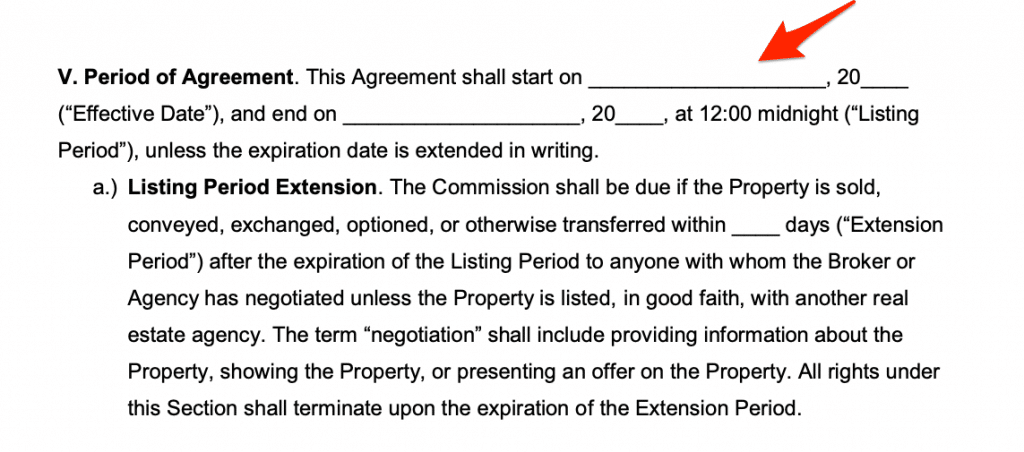
Listing commission rate
Did a realtor tell you their commission rate is 3%? Well, make sure that the rate matches up to what’s on the listing agreement.
Here’s where it appears on the Texas listing agreement; most agents work under a percentage commission basis.
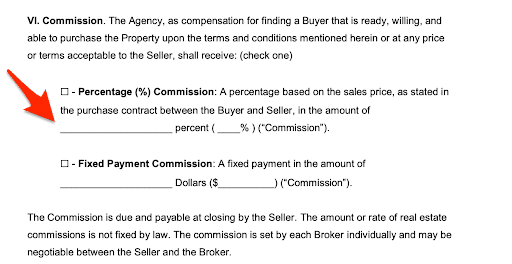
Items that convey with the property
If you plan to keep items or belongings in the home, you’ll need to write that down in the listing agreement. Things like appliances and light fixtures would go here.
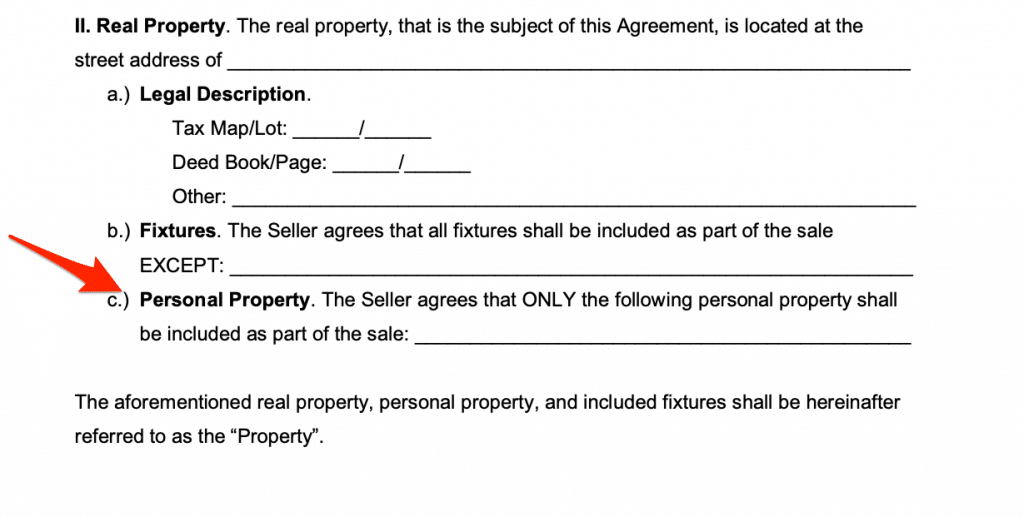
Texas realtor disclosure requirements
Texas law requires agents to provide you with an agency disclosure form, which describes all of the agent’s legal duties to you.
Here are the three main types:
- Single-agent relationship (exclusive right to sell). The agent or broker represents only one party (either the buyer or seller) and acts as a fiduciary. (This gives you the most protection).
- Exclusive agency. You hire an agent or broker to work for you exclusively, but you have the right to sell the property directly to a buyer on your own (with no commission due to the agent).
- Open listing. You can hire multiple agents to try to help you find a buyer, and retain the right to sell the home on your own. The agent that finds a buyer gets paid a listing commission.
Dual agency is illegal in Texas, so an agent can’t represent both you and the buyer in the same transaction.
Contact a local real estate attorney for more advice on Texas listing agreements and required disclosures.
Seller’s property disclosure: What do Texas sellers need to disclose?
Texas home sellers must notify buyers about any defects that may affect the value of the home or the buyer’s readiness to purchase it in a Seller’s Disclosure Notice. You must fill out the form, even if you aren’t planning to use an agent.
The disclosure of material defects on a property should be made prior to executing a contract.
Ask your real estate attorney or agent about your home disclosure requirements, and check out the Texas Realtors website for disclosure FAQs.
Can you sell a house as-is in Texas?
Sellers have the option of selling their house “as-is.” According to the One to Four Family Residential Contract, this means a buyer accepts your home in its current condition at the time the contract is signed.
However, an as-is sale doesn’t exempt sellers from filling out the seller’s disclosure form (you probably still need to).
The buyer can still get inspections and request you to make repairs or back out of the contract.
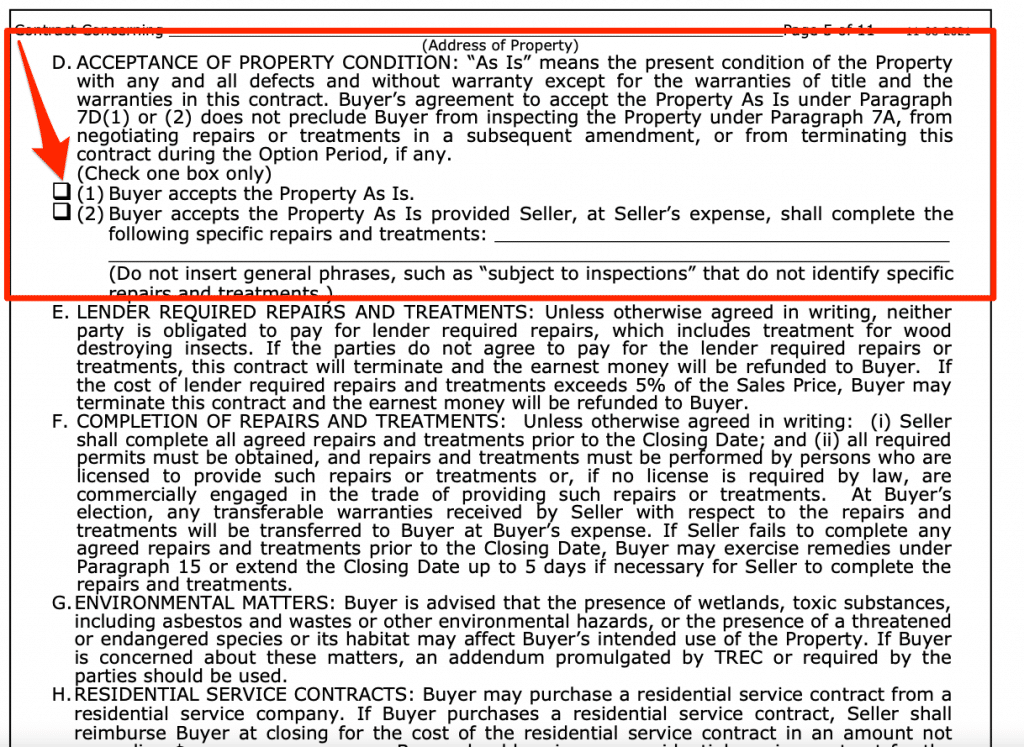
Federal law also requires homeowners to fill out a Texas lead-based paint form for homes built before 1978.
Consult with a local real estate professional or attorney for more guidance on disclosures.
3. Set a price for your listing
Your next step is to determine a competitive listing price for your home.
Home value estimators can provide you with a quick ballpark estimate of your home’s potential value, based on its key features, recent home sales, active listings, neighborhood data, and local market trends.
For a more accurate and in-depth home value report, connect with a real estate agent.
During your initial interview, a realtor should have provided you with a comparative market analysis (CMA) report, which is based on an in-person inspection of your home’s condition, its renovations and upgrades, and what similar homes have recently sold for in your area.
What does a CMA report usually include?
- Recent sale prices of similar homes in your neighborhood.
- How long it took those homes to sell after going on the market.
- Local sale prices vs. initial listing prices.
- How much your home’s upgrades or repairs add to its value.
- Key information about your home and its comparables, including square footage, bedrooms and bathrooms, and the age of each home.
- The agent’s recommended list price.
» Get your home value now: Request a CMA from a Texas realtor
Should I get a pre-listing appraisal?
Appraisals are usually conducted by the buyer during the home sale process, but you technically get a pre-listing appraisal to guide your pricing.
Appraisers typically have more knowledge and experience valuing homes compared to agents, so they may provide you with a more accurate valuation.
However, appraisals are costly ($300 to $450, according to the Texas Appraiser Licensing & Certification Board), and can take 1-2 weeks to complete, so it needs to fit within your budget and timeframe.
4. Prepare your home for sale
Gather important documents
Most Texas home sales require a variety of documents and records for closing. It includes your mortgage statement, homeowners and flood insurance records, homeowners association (HOA) documents, and property taxes.
Gather utility bills, and any home warranties or appliance manuals you might have, in case the buyer requests them.
Get a pre-listing inspection
You can get a home inspection ($300-$400) if you suspect your home has an issue that could potentially delay (or derail) your sale.
A pre-listing inspection can potentially help you spot and fix issues with your home before those issues surface on a buyer’s home inspection.
However, an experienced realtor should advise you on whether the inspection is worth the time and money. (If you’re selling as-is, you probably don’t need one.)
Make home repairs and improvements
Based on the results of a pre-listing inspection (and the condition of your home), it could be worth making certain repairs or improvements.
Common home inspection issues in Texas are related to:
- Water damage from storms, plumbing leaks, or leaky roofs.
- Deferred maintenance on HVAC units.
- Structural defects, code violations, or other safety issues.
Your realtor is in the best position to advise you on which repairs or improvements to make before listing.
Declutter, depersonalize, and clean
It’s a great time to sell, donate, or throw away unused or unwanted items, and re-organize your home before showings.
Make sure all areas of your home are spotless but pay careful attention to areas where buyers will notice dirty areas the most, like your kitchen and bathrooms.
Aim to depersonalize every room, removing family photos, artwork, and posters – it’s best to keep buyers’ attention on your home, not your belongings.
Consider home staging
Staging can increase your home’s appeal and lead to a higher sale price.
Home staging is often expensive, costing up to $600 per room each month in Texas, according to the Houston Association of Realtors.
However, pricing depends on the size of your home, the number of rooms staged, and your local market. Consult with your realtor for advice on whether or not home staging is right for you.
Texas home sale calculator: View your estimated net proceeds
Curious about what you might earn in your home sale? Here’s a calculator to show you your potential net proceeds after factoring in various home sale costs, including realtor commission and closing costs.
» LEARN: What to know about seller closing costs
5. Market and show your home to buyers
Now it’s time to actually list your home and host prospective buyers!
Your listing agent will put a “for sale” sign on your front lawn and post your home for sale on the multiple listing service (MLS): a database most real estate agents use to market and sell properties.
Your agent should also list your home on all popular real estate websites (like Zillow and Trulia), and host an open house to drum up more interest.
If you’re selling without an agent, consider a flat-fee MLS company, so your listing reaches buyers’ agents and their clients. You can also post your listing on Zillow and social media to get max visibility.
My listing is live: What happens next?
Listing your home for sale can be both exciting and nerve-racking! Here’s what to do next:
- Have a plan in place for your pets. I’ve had sellers keep their pets in the backyard or garage during showings, while others removed them from the home. It’s your call! Don’t forget to notify buyers before showings.
- Check out your listing on Zillow and other popular sites. Make sure you like all of the photos used by your agent (contact them if you don’t) or add new photos yourself.
- Double-check your listing description. It should describe all of your home’s main features and selling points, and have good grammar and punctuation.
- Keep an eye on your listing activity. You can check how many potential buyers have viewed and saved your listing on Zillow and compare that to other local listings. This information can be found under “overview” on your listing’s Zillow page (example below):
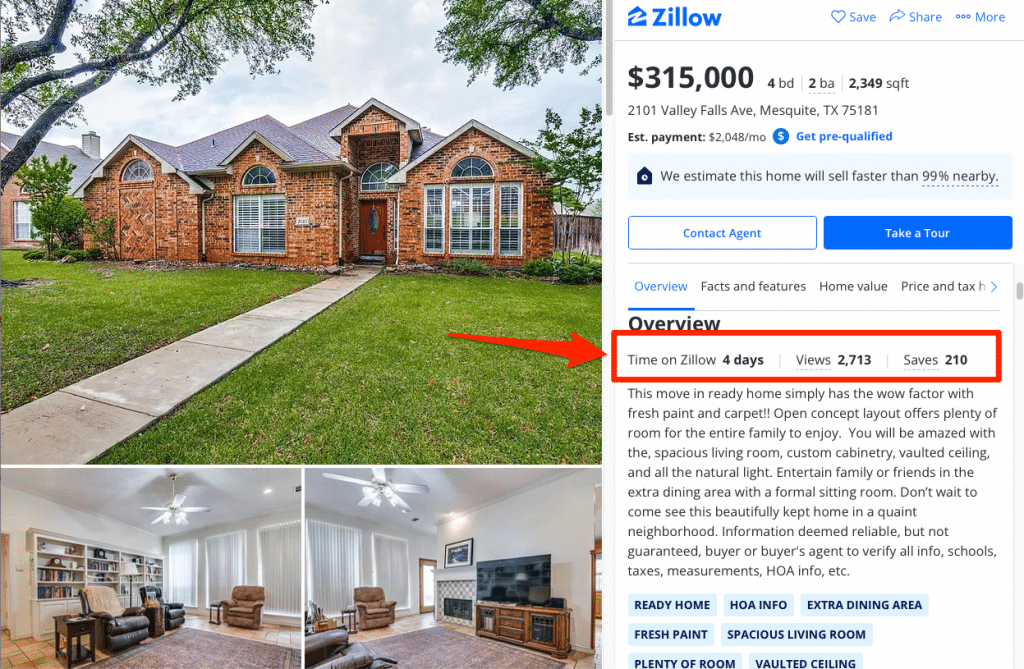
What to expect from buyer showings (tips from a realtor)
5. Negotiate with buyers
Hopefully, you’ve received multiple offers within just a few days or weeks of going live! The offer will come through in the One-to-Four Family Residential Contract.
There are three ways you or your listing agent can respond to a buyer’s offer:
1. Accept the offer. If the offer has everything you’re looking for – price, terms, and timing all look great – then you might just want to accept it without countering, especially if no other offers are on the table. Your agent will send over a real estate contract to sign.
2. Counter the offer. Most of the details of an offer are negotiable, including the home’s sale price and closing date. It could make sense to counter an offer if you’re confident you’ll receive another good one if the buyer declines it.
⚠️WARNING! If you counter an offer and the buyer accepts it, you’re technically under contract. Be careful if you plan on countering multiple offers because you could technically be under contract with multiple buyers.
3. Ignore the offer. You don’t have to respond to a lowball offer or one that doesn’t meet any of your criteria – especially if you have stronger offers on the table (or you’re confident others will come in.)
How long does it take to sell a house in Texas?
Timing depends mainly on your home’s desirability, and how well you’ve priced your home (higher-priced homes usually take longer to sell).
Texas listings are on the market for a median of 43 days, although that figure is lower in several major cities, according to Realtor.com.
| City | Median time to sell |
|---|---|
| Austin | 72 |
| Dallas | 61 |
| Fort Worth | 67 |
| San Antonio | 70 |
| Houston | 55 |
Talk with your agent to discuss expectations on when you might receive an acceptable offer after going live.
7. Review paperwork and sign an offer
Once you’ve decided on an offer, it’s time to review the contract and sign it!
Once all parties have signed, your home is under contract and you’re just a month or so away from closing!
In Texas, it usually takes about 35 days to close on a home sale after accepting an offer, lower than the national average of 58 days, according to Ellie Mae’s 2021 origination insight report.
What’s in a Texas purchase and sale agreement?
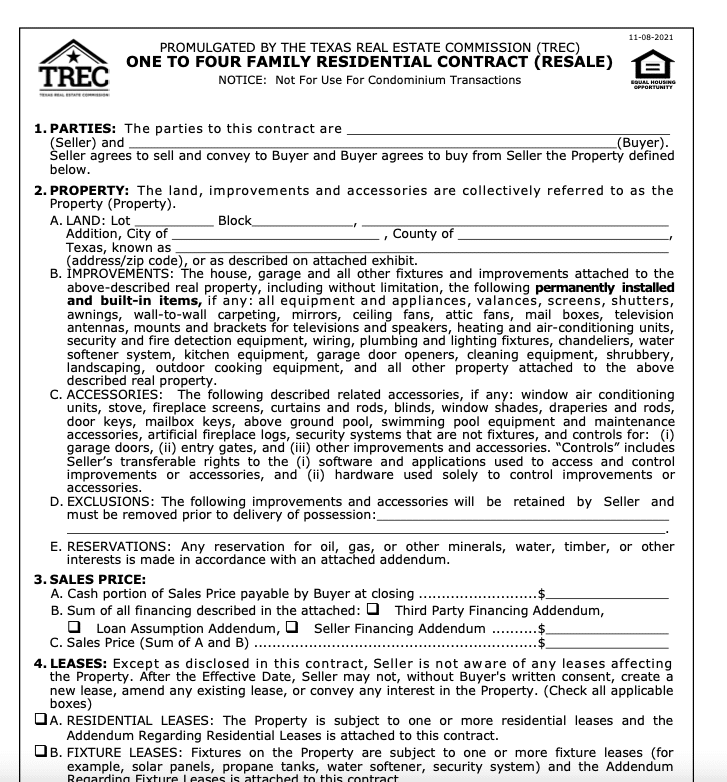
Texas’ One to Four Family Residential contract contains several key items to pay attention to, including:
- Parties and property. The buyer and seller’s full legal names, and your home’s address, including its lot and block information.
- Sales price. How much the buyer is offering to purchase your home and the type of financing.
- Earnest money and termination option. How much the buyer is offering to deposit, when it’ll be delivered, and how long they have to terminate the contract.
- Property condition. If the buyer has or hasn’t received the property disclosure yet (if they haven’t, how many days do you have to deliver one to them)?
- Closing. The estimated date of closing, and when ownership transfers to the buyer.
- Personal property. If the buyer is asking for any of your personal property to transfer in the sale, such as appliances or storage sheds.
8. Conduct inspections, appraisals, and closing walk-through
Home inspection
Texas contracts typically provide buyers with a period of time during which time they can conduct a limited, “non-invasive” visual inspection of the home.
Don’t worry: this step is a totally normal part of the home sale process. In fact, the vast majority of home buyers (87%) have a home inspection contingency nationwide.
You probably shouldn’t be home for the buyer’s home inspection. There’s a chance the buyer will be attending, along with their agent and inspector.
What do I have to fix?
Sellers usually don’t get to see the buyer’s home inspection report. But the buyer might ask you to fix any defects or serious issues discovered in the inspection. If that’s the case, you can request a copy of the report to see what’s up.
Check with your agent to learn what you’re obligated to fix and the best way to move forward following the inspection.
Termite inspection
Termites are common in Texas, and the buyer might order a Termite and Other Wood Destroying Organism Report (WDO).
Depending on your sale contract, you may or may not be on the hook for the cost of a termite inspection ($100 – $150). Check with your agent for more information.
Appraisal
Lenders often require buyers to get an appraisal to determine the home’s fair market value and to be certain that the home is worth its purchase price.
The appraiser will likely visit your home to take interior and exterior photos, noting any value-adding features or upgrades. They’ll compare your home to recent sales in your area, to determine a fair market value.
You’ll get notified if the appraisal value comes in lower than the buyer’s purchase price. If that happens, you may have to re-negotiate the price with the buyer. (Talk to your agent for advice on dealing with a low appraisal.)
Final walk-through
Buyers usually ask to do a walk-through of the home a day before closing. Don’t worry: the buyer just wants to make sure the home is in the same condition since their last viewing.
Here’s what you need to do before their walk-through:
- Clear out your house entirely if you haven’t yet, removing all personal belongings.
- Repair or patch any damaged drywall, paint, or nail holes.
- Make sure items included in the sale contract are still there (appliances, light fixtures, etc).
- Do some light cleaning if the home is dirty.
9. Close on your home sale
You’re almost at the finish line! Here’s what to do in the days leading up to your scheduled closing.
- Look out for a closing disclosure. You’ll likely need to sign this form 1-3 days before closing. It contains every cost to be paid by the buyer and seller and your estimated net proceeds. Double-check all the numbers with your agent, and speak up if the numbers don’t look right.
- Clear out your house entirely. Your home should be completely empty before the buyer’s scheduled closing walk-through, so do another walk-through before then just in case you missed something.
- Hand the keys to your agent. Your realtor will likely need your house keys and garage door openers to hand over to the buyer’s agent. If you’re selling FSBO, you may need to hand them over to the buyer’s agent, or your attorney.
- Find out when and where the closing is scheduled. Most of the paperwork has already been completed on your end. Ask your agent if you need to attend your closing in person, if you can sign any remaining paperwork digitally, or if you need to give your agent power of attorney to close.
- Keep in touch. Don’t be surprised if the closing doesn’t happen exactly at its scheduled time, as delays are common. Your agent should keep you updated on closing status 24/7.
💰Final step: Getting your paycheck!
Congratulations! After you and the buyer have signed all documents, the closing is official.
The home’s sale price will be used to pay out the realtor commission, closing costs, and cover any outstanding mortgages or liens owed on the property.
Your net proceeds can usually be wired to your bank account after closing. For more details on how to get paid, contact your agent, attorney, or title company.
Selling a home in Texas: Next steps
There are a few things you might want to do after closing.
Save your home sale documents
It’s best to keep both physical and digital copies of the home sale contract for your taxes and personal records.
Calculate your potential capital gains tax
You may or may not owe tax on the sale of your home.
The IRS excludes home sale gains of up to $250,000 for an individual and $500,000 for a married couple who’ve lived in and owned a home for at least two of the last five years.
Contact your tax advisor for more guidance on capital gains tax and if you’ll owe anything.
Notify the U.S. Postal Service and DMV
It’s a good idea to set up mail forwarding to your new address via the USPS website (it costs $1.10 to do so).
Are you staying in the state? The Texas DMV requires residents to fill out and submit a Change of Address for Texas Motor Vehicle form.
If you’re moving out of Texas, the state’s DMV says that you can keep your plates as a souvenir.
Consider showing your agent some love
Your realtor will be thrilled if you left them a positive Zillow review, or if you refer them to family and friends who are interested in buying or selling a home.
FAQ
Can you sell a house "as-is" in Texas?
Yes. Selling "as-is" means the buyer accepts your home in its current condition.
However, Texas sellers are still required to fill out a property disclosure form, which notifies buyers about any known defects that may impact your home's value. This form is filled out and submitted to home buyers before executing a sales contract.
We highly recommend you speak with a local real estate agent or attorney to discuss your home disclosure requirements. If you need an agent, an agent matching service can provide you with several quality options (with no obligation).
How much are Texas closing costs for sellers?
Texas seller closing costs average around 1.2% of the home's sale price, or $3,600 on a $300,000 home. This fee includes common costs like title service and owner's title insurance, transfer tax, and recording fees.
It does not include Texas realtor commission, which averages 5.78% (covering both the seller's and buyer's agents). Texas sellers can save money on commission by either going the FSBO route, or using an agent matching service for a 1.5% fee.
Do you need a realtor to sell a house in Texas?
You can sell a house without using a realtor in Texas, which would save you from paying listing agent commission (which averages 2.89% in Texas).
But selling FSBO isn't for everyone. We only recommend FSBO for sellers with prior real estate experience, or if you're selling directly to someone you know (like a friend or family member) and not listing your home on the market. Learn how to decide if FSBO is for you.
What are the legal documents required to sell a house in Texas?
There are a number of legal documents required to sell your Texas home. They may include the following forms:
- Texas One to Four Family Residential Contract (Resale)
- Texas listing agreement (exclusive right to sell, exclusive agency, or open listing), if using an agent
- Texas seller's property disclosure form
- Termite and Other Wood Destroying Organism Report (WDO)
- Buyer's home appraisal
- Homeowners association addendum
- Flood insurance documents
- Lead-based paint disclosure
- Closing disclosure
- Signed deed
- Bill of sale
- Affidavit of title
Most of these forms can be found on the Texas Real Estate Commission website.
While you don't need a real estate attorney to close on a home sale in Texas, we highly recommend consulting with one if you plan to sell FSBO, to make sure you comply with local laws.
Related links
What Does it Cost to Sell a House in Texas? View all of the expected home sale costs facing Texas sellers, including realtor commission, seller closing costs, and more.
How to Choose a Realtor: Expert Secrets. Learn how to vet agents, set up interviews, read and sign a buyer’s agency agreement or listing agreement, and pick the best realtor for you.
How to Sell Your House – The Ultimate Guide: Our guide breaks down the process of selling your house from start to finish, to educate you on the process and help prepare you for your big sale.
How to Sell a House Without a Realtor: If you know what you’re doing, you can cut out seller agent fees by listing your house “for sale by owner” (FSBO). Learn more now.
Realtor Fees in Texas: Learn the typical real estate commission and fees charged by Texas realtors, and how to negotiate rates and save on commission.
Clever Real Estate – Must-See Reviews: The Real Estate Witch team reviews the agent-matching service Clever Real Estate. Does its service actually save sellers $9,600 in commission fees, on average, as it claims?

Leave a Reply